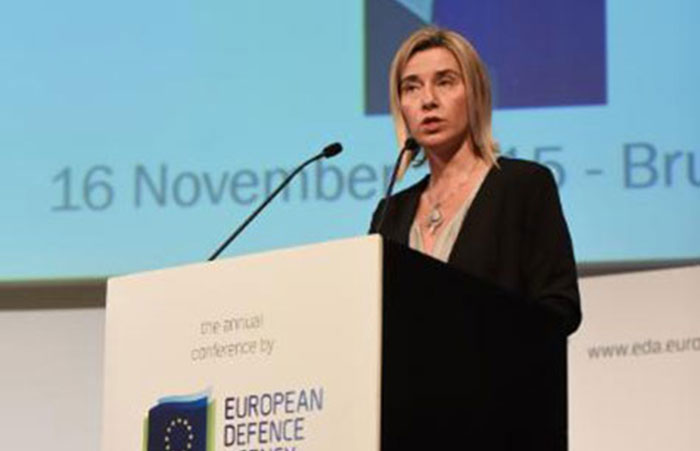What happened last Friday in Paris will stay as a scar in our European memory. The terrorist have targeted once again the very heart of Europe. (…) We know what they are trying to do. They want us to look at each other with suspect. They want us to be afraid of those of a different colour, or who speak with a different accent. They play on our fears to tear our societies apart. Our societies will not be destroyed by “the other”; they can only be hurt by our fear of the other.
(…)
In these days after the attacks in Paris, Vienna and the Vienna process are more important than ever. And it is moving forward. The attacks in Paris, in Beirut, in Egypt, in Turkey and elsewhere all point in the same direction: they want to divide us, they want to weaken our resolve to move beyond our differences. They want us to give up our work for a political, diplomatic solution to the war in Syria.
(…)
The fact that (the new EU Global Strategy) will be “global” does not mean it will be less security-focused. On the contrary. Security and defence will be an integral part of each chapter. For each objective, we will identify the defence-related instruments we need. The value of our work on what we traditionally define as security and defence will be enhanced – not diluted – by being addressed together with other instruments. Complementarity is the key. I think we have all moved beyond the old-fashioned cultural dispute between defence and development.
(…)
In these very days, European policy-makers are exposed to opposite pressures. On the one hand, we are asked to ‘shut the door’ of our continent, to seek isolation from the rest of the world. The events in Paris are another tragic reminder that isolation is not an option for us. The traditional boundaries between internal and external policies no longer hold. Turning inwards will only make us more vulnerable, not more protected.
(…)
On the opposite side of the debate, some voices are calling for a more aggressive foreign policy, as if our action alone could solve all the world’s problems. Recent history should teach us. Yes, we must engage with our neighbourhood. But we must also do it responsibly, taking all factors into account, with a rational approach and a rational strategy. The military, and military intervention, can never be the only solution. Still, the military is and remains a crucial part of our overall toolbox.
(…)
A big part of the answer involves our relationship with our partners. In a world where power is more fractured, global security can only be achieved through a collective effort. We have a strong interest in pushing forward our common work with NATO – and I am truly grateful to Jens (Stoltenberg, NATO Secretary General) for our excellent cooperation during our common first year of mandate. (…) And we also have a strong interest in developing new kinds of cooperation with other regional organisations – think of the African Union – which can take responsibility for the security of their continent.
(…)
In our recent past, the ambition to lonely take charge of our neighbourhood backfired. Today we can build up new alliances to address the common challenges we face. Partnerships in which everyone follows their own interest, to the benefit of all. Win-win partnerships are the best way forward in the world of today, in a more cooperative global framework.
(…)
Today I am not here to tell you we must do “more with less” – and this was written down in my speech even before I listened to you – I am not a big fan of this expression. Yes, we must spend better. But we must also spend enough.
(…)
Our European Defence isthe European Defence Community we are realising that the security of our Union calls for greater integration. We should not be afraid of looking in very concrete terms at some of the Treaty provisions that do allow for taking defence cooperation within the EU a step further. It is not an ideological debate, and it should not be. The debate between euro-sceptics and euro-philes can only lead us so far. The national interest of all Member States calls for better security and defence. In a more connected world, with harder budget constraints, European cooperation can best serve national interests.



